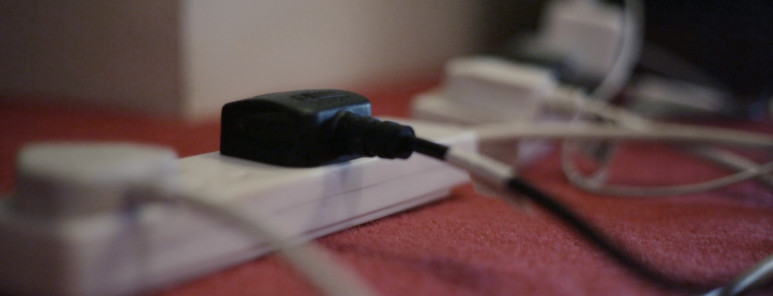Electricity is involved in about two thirds of all accidental house fires, with household appliances the most common culprits.
Sometimes fires are caused by faulty goods, which could be small items like mobile chargers, or big things like washing machines and dryers.Fires are also caused by people misusing electrical appliances, for example by leaving them plugged in for too long or covering them up allowing them to overheat.
Another big problem is overloading sockets and extension leads. Although many extension leads have four or more plug sockets, it doesn’t mean they can take that many items. High powered appliances like hair dryers, straighteners and irons can easily cause you to exceed the extension lead’s the limit, which is normally 13 amps.
Our top tips to try and prevent electrical fires are:
- Don’t overload plug sockets – try to use one plug per socket and don’t plug an adaptor into another adapter
- Look out for signs of dangerous or loose wiring, such as scorch marks, hot plugs and sockets and fuses that blow
- High powered appliances, such as washing machines, should be plugged into a single socket
- Check the fuse ratings of appliances – normal extension leads only take a maximum of 13 amps
- If you use an electric blanket, check it regularly and roll it up or store flat – don’t fold them
- Never use a hot water bottle in the same bed as an electric blanket and unplug it before you go to bed
- Don’t buy cheap, unbranded chargers or equipment – stick to reputable suppliers and traders
- Don’t leave white goods, such as washing machines and tumble dryers, on overnight
Overloaded sockets
If you’re worried about overloaded electrical sockets, you can try the plug socket overload calculator from Electrical Safety First.
Product recalls
Electrical Safety First also provides a list of electrical products which have been recalled for safety reasons.
If you buy a new electrical appliance, particularly something large like a fridge, freezer, washing machine, dishwasher or tumble dryer, you should also register it. That way you will have peace of mind that if your appliance is recalled for safety reasons, you will be the first to find out. You can do this at Register My Appliance.
Fake goods
There are lots of cheap, unbranded goods on the market, particularly on the internet. There is more about the dangers of counterfeit, sub standard electrical goods here.
If you come across any of these goods, either new or second hand, they should be reported to your local Trading Standards department. This is so these products can be dealt with, helping us reduce the amount of electrical fires we attend in South Yorkshire.
Charging your e-bike or scooter
The majority of fires related to e-bikes and e-scooter have happened in homes. These fires are often caused when charging batteries.
Please pay special attention to bike conversion kits. Do not attempt to modify or tamper with the battery. Always follow the manufacturer’s instructions.
Reduce the risk of overheating
- Batteries can get warm during their use. Allow them to cool down before attempting to re-charge.
- Batteries should always be charged on hard flat surfaces where heat can dissipate.
- Batteries can also pose a risk if they have been damaged, so try to ensure they are not getting knocked around while in use or while being carried.
- Batteries should also never be exposed to extremes of temperature.
Follow the instructions
- Always follow manufacturers’ instructions when charging
- Never leave it charging unattended and never charge it while you are asleep.
- You should always make sure you unplug your charger once it’s finished charging.
- Always use the correct charger for your batteries and buy any replacements from a reputable seller.
Where to charge your batteries
- Never block your escape route with e-bikes or e-scooters
- Store and charge them somewhere away from a main through route or exit
- Make sure you and your family have an escape plan in place in the event of a fire. Always call 999, never try to fight the fire yourself

